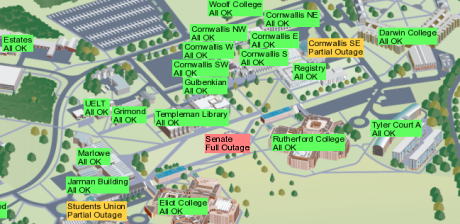Did a university disable the Wi-Fi for protesting students?

Students protesting at the University of Kent by occupying a key building on campus have been disconnected from the wireless network, shortly after a court date was given to them for an eviction hearing.
The BBC report that while some students had returned home for the holidays, nearly a dozen students remain to occupy the Senate building over Christmas and New Year. Yet the wireless network service has been cut off to the building where the students are occupying, shortly after the court date was issued, leaving many to struggle to communicate with the outside world.
Because of the legal implications now involved in the occupying protest, students are no longer allowed access to the building and if a student leaves, they are not allowed to return. Food supplies will become limited and heating has also been turned off.
The occupation has a growing following on both Twitter and Facebook, with local celebrities and well-known personality, Alan Davies from BBC's QI programme with Stephen Fry lending his words of support. The lack of internet access to the building is causing difficulties to the students, who all continue study at the university, to communicate with the outside world.
One occupier told me:
"[Internet access] a big part of what keeps everyone going is the messages of solidarity from all over the place, mainly on Facebook and Twitter. Contacting the media is obviously almost impossible without the internet. There is no way to attain phone numbers to contact without it, and the internet is vital for keeping up-to-date with the news.
Updating the Twitter followers and Facebook fans of what's happening inside the occupationis obviously also really important, and impossible without the internet."
Since the start of their occupation, the group of students has received a large gathering of press coverage, ranging from television, radio, celebrity tweets and interactive services, including the BBC, local media and also here on CBS Interactive's ZDNet.com.
The wireless network across campus is fully working besides a partial outage in two buildings, and a distinct full outage in the occupied building. What leads to suggestion that the university has forcefully disabled wireless access in the building is no mention of an outage or maintenance work on the university's IT status page.
The cached by Google on the 21st December shows no issue and the up-to-date page at the time of publication still shows no outages. The university is due to close for the holiday season later today.
The occupation of the Senate building is of a long line of other similar action, in protest at the trebling of tuition fees in England, and is the last occupation of any other university or college in the United Kingdom.
Vice-chancellor Julia Goodfellow sparked controversy by signing a letter to the Telegraph supporting the decision to hike tuition fees, forcing students to repay a loan at the end of their studies totalling nearly £30,000. Though Goodfellow since "deplored the cuts to higher education funding" in a letter to local media, this did not offer solace to the students staying in the university building.
The university were unable for comment.
Do you think the university forcefully turned off the wireless to prevent further media coverage?
